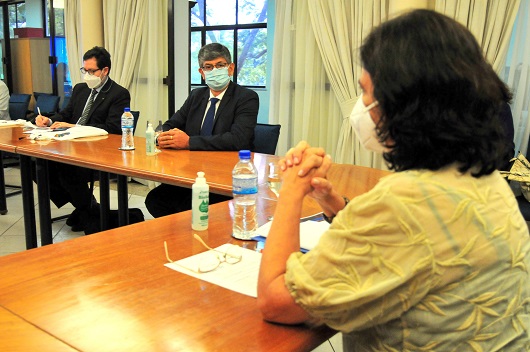Ecuador ambassador visits Fiocruz and discusses scientific cooperation
25/02/2022
Cristina Azevedo (Fiocruz News Agency)
In this role for less than five months, the new Ecuador ambassador in Brazil, Carlos Alberto Velástegui, visited Fiocruz last Friday (February 18) to strengthen the ties between his country and the Foundation. In the company of consul Marco Larrea, he was welcomed by Fiocruz president, Nísia Trindade Lima, and showed interest in defining areas for possible cooperation with Ecuador institutions and in getting to know more about the production of vaccines against COVID-19 and other diseases.
Nísia Trindade Lima and ambassador Velástegui (center) talked about scientific cooperation (Image: Pedro Paulo Gonçalves/Fiocruz)
Ambassador Velástegui has visited Fiocruz in 1997, when he was the consul in Rio de Janeiro. Now, in this new position, he is visiting institutions that can provide possibilities of partnership during his tenure. Health is one of these areas.
“I am familiarized with your work and with the cooperation we have with Fiocruz, a long and historical relationship. The challenges we face today are not limited to the pandemic. Health is a crucial part of the care provided to the population. We wish to know more about its innovations and how Ecuador can participate in this cooperation. And cooperation means more than just acquiring vaccines. It also includes acquiring knowledge”, said Velástegui, who raised the possibility of a remote conference with health professionals from his country to better explore the subject.
Health diplomacy
In addition to the possibility of donating vaccines manufactured by the institution, another topic discussed was the possibility to increase the partnership with Ecuadorian institutions by means of bilateral agreements and of the networks established in Latin America, as already happens regarding the training of professionals by the National Health Institutes Network and the Technical Health Schools Network.
“This visit is taking place during a special moment for us, as we are getting ready to deliver to the Ministry of Health the first batch of COVID-19 vaccines made 100% here, in Manguinhos, thanks to the incorporation of the Oxford/AstraZeneca vaccine technology. It is a very special moment for us and we also hope it becomes a moment of increased international cooperation”, said Lima.
Both parties highlighted the importance of health diplomacy, a field that was put in the spotlight during the COVID-19 pandemic - the need to strengthen production chains in Latin America to reduce external dependence and to foment mutual aid.
“The pandemic represents a moment in which humanity should get together. Ecuador needs more vaccines and we need to find ways to help our people”, said Marco Larrea, consul in São Paulo, and now also responsible for Rio de Janeiro.
Marco Krieger, vice-president of Production and Innovation in Health for Fiocruz, was put in charge of a presentation regarding the Foundation, showing that its range of action goes from basic research to production, encompassing all areas of what he defined as the health ecosystem. “Using science to benefit society is in our DNA”, he said.
Krieger emphasized not only the record-time development process for the COVID-19 vaccine and for the production of test kits, but also genomic surveillance, a field in which Lima hopes cooperation with other Latin American countries will increase.
Mauricio Zuma, general director of Bio-Manguinhos, mentioned the participation of Ecuadorian professionals in courses during the 1990s held at Fiocruz. He also highlighted the partnership with the Pan-American Health Organization (PAHO). “Today we export vaccines against yellow fever, against meningitis... And we are working on other products as well”, he said.
Pedro Burger, the assistant coordinator of the Fiocruz Global Health Center (CRIS/Fiocruz), emphasized the fields of cooperation between the Foundation and Ecuadorian institutions, and stated he is ready to work to strengthen these ties.
“Cooperation in the field of knowledge and sharing is one of our concerns. We have a WHO mandate to work as a hub for mRNA vaccines in Latin America, and this knowledge will be shared”, said Lima.
The meeting was also attended by Valber Frutuoso, assessor of the Presidency’s Office for Institutional Relations.





